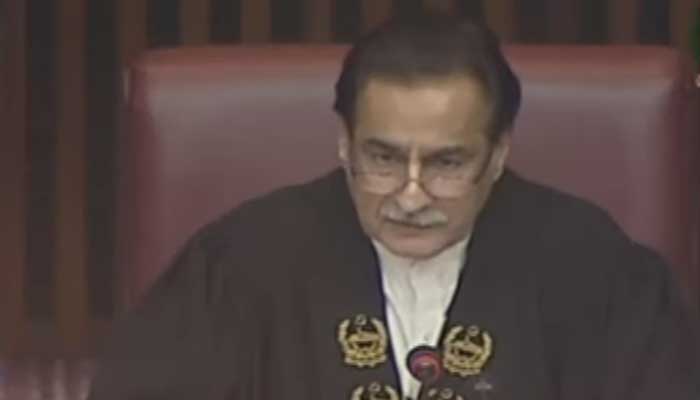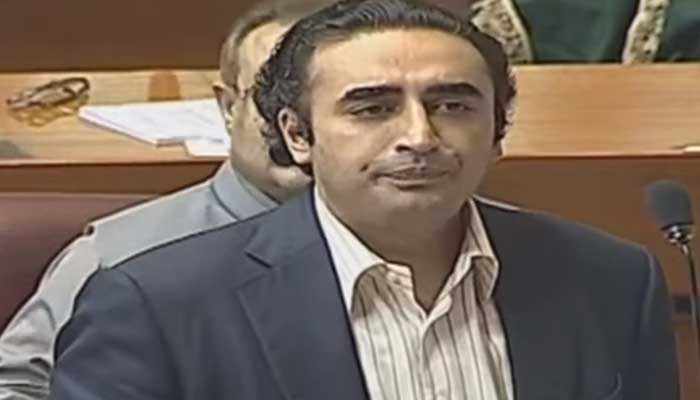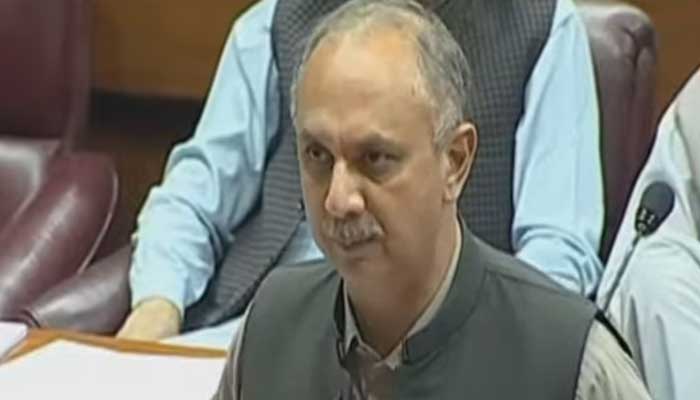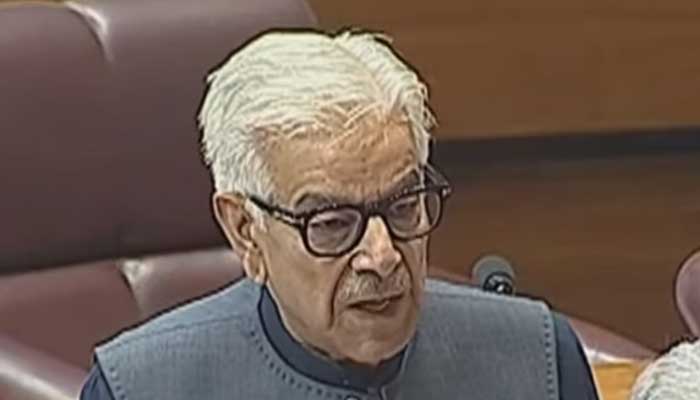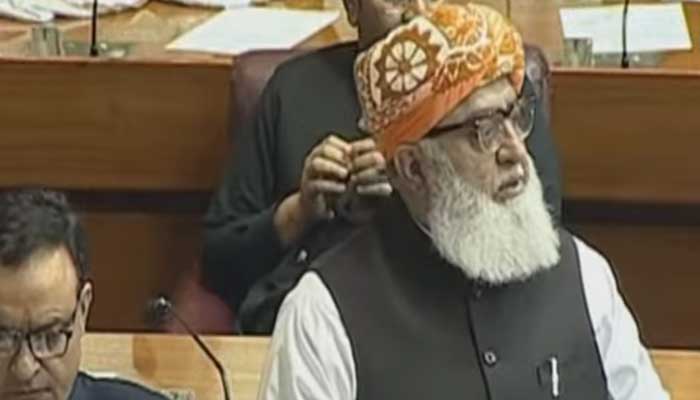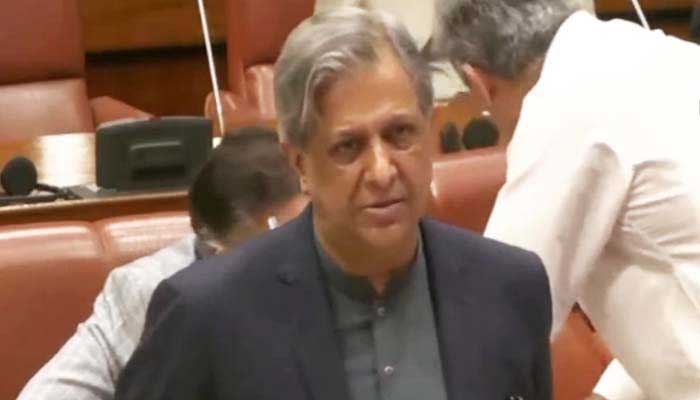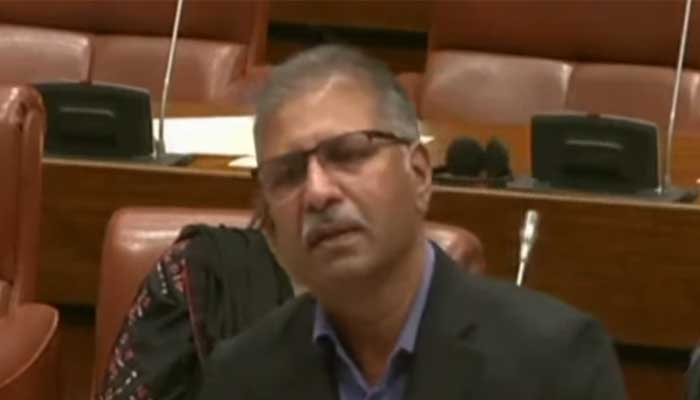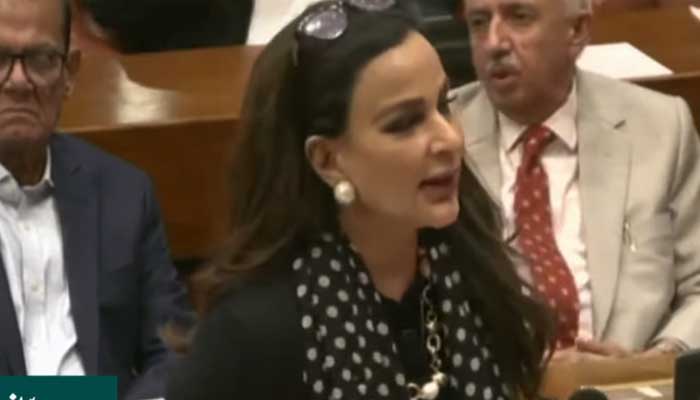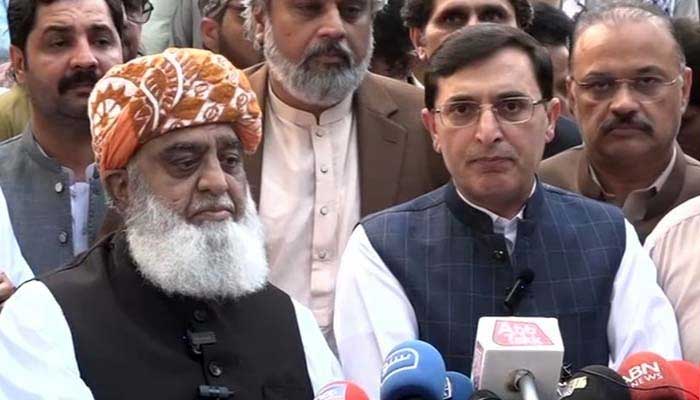After Senate, NA passes 26th constitutional amendment bill just before dawn
Senate approves 26th constitutional amendment, capping Chief Justice of Pakistan's tenure at three years
Following approval from Senate, the National Assembly passed the 26th Amendment Bill in the predawn hours on Monday, 2024, with a majority vote, capping the tenure of Chief Justice of Pakistan (CJP) at three years.
The bill, which was approved by the federal cabinet on Sunday with the consensus of the government’s coalition partners, was presented in the in the House by Law Minister Azam Nazeer Tarar.
The NA session — which commenced by Sunday midnight and extended into the early hours of Monday morning — witnessed heated debates between opposition and treasury benches, with the former calling the amendments an attempt to suppress the judiciary.
Once the speeches were concluded, NA Speaker Ayaz Sadiq began the voting process on the constitutional amendment bill.
The members of opposition party, Pakistan Tehreek-e-Insaf (PTI) staged a walkout during the voting on the amendment bill.
The newly passed bill will now be sent to the president for assent, under Article 75 of the Constitution.
Highlights of 26th amendment:
- Chief justice’s tenure fixed at three years.
- Constitutional benches to be established at Supreme Court and high courts.
- Senior-most judge of each bench to serve as presiding officer.
- Parliamentary committee to nominate new CJP from panel of three most senior judges.
- Committee to propose name to PM, who will then forward it to President for final approval.
- JCP, led by CJP and three others, responsible for appointment of SC judges.
- JCP to monitor judges’ performance, report any concerns to Supreme Judicial Council.
- Complete eradication of Riba (interest) from country by January 1, 2028.
The politicos continued to hold consultations on the constitutional tweaks till late Saturday night, with uncertainty regarding the tabling of the draft due to severe opposition from the Pakistan Tehreek-e-Insaf (PTI).
The coalition government was initially set to present the legislation yesterday but decided to defer it at the request of the Jamiat Ulema-e-Islam-Fazl (JUI-F) chief Maulana Fazlur Rehman who said that his party would be able to cast its votes in favour of the 26th constitutional amendment after receiving a response from the PTI.
The former ruling party has time again expressed concerns over the prospective judiciary-oriented legislation provisioning a fixed three-year term of the Chief Justice of Pakistan (CJP), establishment of constitutional benches, restructuring of the Supreme Judicial Council, and the formation of a Special Parliamentary Committee which will suggest names from amongst the three most senior judges of the apex court for the CJP's appointment.
NA Session
Speaking on the NA floor, Pakistan Peoples Party (PPP) Chairman Bilawal Bhutto-Zardari said the government had achieved the broadest possible consensus with the opposition on the bill.
"It is the opposition’s democratic right if it does not cast a vote," he said, adding, "The PML-N has the fewest, while the PPP and JUI-F have the most points in the constitutional package."
"About 99% of the objections to the constitutional amendment are from the PTI," he noted, further stating, "Whether the opposition votes or not, it has played a part in the success."
"The 18th Amendment was a revolutionary reform; this [26th Amendment Bill, 2024] is also a historic one."
"Justice Dorab Patel was the judge in the Zulfiqar Ali Bhutto murder case," he said, noting that if Justice Patel had cared about the position, he would have taken the oath as Chief Justice. However, he added, Justice Dorab did not accept dictatorship and resigned.
Bilawal later mentioned that Patel went on to found the Human Rights Commission.
He further said that every political party had signed the Charter of Democracy (CoD), which also included the formation of a constitutional court.
"Whether a constitutional court or a bench, the people are being served," he added. He also rejected claims of urgency to pass the amendment bill.
"People's representation in the judicial reforms has been restored," the PPP chief said.
He pointed out that originally it was the Governor General’s prerogative to appoint or remove a judge, and that authority was later transferred to the president.
"In 1996, the authority was taken away and handed over to the Chief Justice," he explained, noting that Benazir Bhutto was about to appoint the country’s top judge, "but certain individuals could not stand it."
Speaking on the NA floor, Opposition Leader Omar Ayub lambasted the constitutional amendments, calling them an attempt to strangle the independent judiciary.
He said those who had “gone missing” should have been thanked as well, adding that the government, which came into power via rigging, had no right to amend the Consitution.
He alleged that several PTI lawmakers were “abducted” and the government was trying to enact the amendment at “gunpoint”.
The opposition leader questioned the urgency behind passing the bill, asking: “What would have happened had it been passed on October 31?”
Addressing the lower house, Defence Minister Khawaja Asif stated that the 26th Amendment Bill "aims to restore the respect and dignity of the parliament as guaranteed by the Constitution of Pakistan".
“We are empowering the parliament, as agreed in the Charter of Democracy signed by all political parties,” he said.
“Today’s amendment restores power to the people of this country, through their elected representatives.”
Asif highlighted that thousands of cases were pending in the superior courts, and he expressed optimism that reforms in the judiciary would help improve the performance of the courts.
“Politicians face disqualification, they sacrifice their lives and endure imprisonment — why can’t the judiciary be held accountable?” he added.
Voicing support for selecting the CJP from a panel of three senior judges, as proposed in the amendment, the minister said that the current government would complete its constitutional tenure.
Backing the bill, JUI-F chief Maulana Fazlur Rehman remarked that the ruling party feared one judge, while the opposition was scared of another.
Stressing the need for impartiality, the cleric, noted for his political shrewdness, said that he had warned against holding amendments hostage to clash of personalities.
Saying that the constitutional package aimed to reform the judicial system, Fazl noted that the matter of the constitutional court was mentioned in the Charter of Democracy (CoD) signed between PML-N and PPP in 2006.
Praising the CoD, he clarified that while it was not a substitute for the Constitution or the law, it served as a guiding document when facing challenges in the democratic process.
Senate approves amendment bill
Earlier, the Upper House of Parliament approved the amendment bill, capping the CJP's term at three years.
The bill — containing 22 clauses — was introduced by Tarar in the upper house of parliament hours after the federal cabinet's nod, following weeks of uncertainty.
Later, Senate Chairman Yousaf Raza Gilani read out its contents and asked lawmakers to cast their votes. Following the voting, the constitutional amendment bill was passed by a two-thirds majority.
Announcing the result, Gilani said: “65 members casted votes in favour of the motion regarding the passage of the bill, and four members are against it. Consequently, the bill stands passed.”
In the session, 23 senators from PPP, 19 from PML-N, 5 from JUI-F, and 4 from BAP voted in favour of the constitutional package. Additionally, four independent senators, two from BNP, three from ANP, and three from the MQM-P supported the bill. One senator each from PML-Q and the National Party also voted in favour.
During the Senate session today, Federal Minister for Law Azam Nazeer Tarar announced that the government's allied parties and Jamiat Ulema-e-Islam-Fazl (JUI-F) have agreed on the draft of the constitutional amendment bill.
In line with the government's efforts, a special parliamentary committee, consisting of representatives from all political parties, deliberated on the proposed constitutional package.
The law minister, addressing the Upper House, requested Senate Chairman Yusuf Raza Gilani to permit him to present the draft of the 26th Amendment Bill.
He urged the chairman to include the proposed amendments in the House's supplementary agenda. Additionally, he informed the Senators that the process for appointing judges had been modified in the 18th Amendment.
"CJP Qazi Faez Isa has consistently expressed his lack of interest in extending his tenure as the top judge," the law minister said in response to the criticism from the opposition.
Once again, dispelling the widespread notion, the minister categorically stated that CJP Isa would retire as scheduled.
Additionally, the minister mentioned that one of the draft amendments pertained to the constitutional benches of the apex court.
Stressing the necessity of judicial reforms, Tarar, without specifically naming anyone, referred to a former chief justice who frequently issued suo moto notices. Furthermore, Tarar remarked, "Our courts sent elected prime ministers home."
Detailing the bill, the law minister said that a constitutional bench would be established within the Supreme Court.
He added that the judges would be appointed by the judicial commission, and the commission should have the authority to assess the judges' performance.
"Constitutional benches will be formed by the commission, and the term of the top court would be limited to three years, with the top judge being selected from the three senior-most judges of the apex court," the Tarar said giving an overview of the bill.
To enhance the legislature’s role in appointing judges, Tarar mentioned that the 12-member parliamentary committee, with a two-thirds majority, would appoint the CJP.
In the updated draft, it was also noted that constitutional benches could be established in the provinces. The minister emphasised that the purpose of the bill was to provide prompt and affordable justice to the common man and urged the Upper House to vote in favour of the bill.
Speaking on the upper house floor, PTI Senator Barrister Ali Zafar termed the Constitution a ‘social contract’, that unites the nation. “If there is no consensus, the Constitution will die its own death,” he said.
He pointed out that the Constitution is formed with the consent of the people and the “amendments should also be made with their consent.”
Zafar cited the example of Article 58(2)(b) — which empowers the president to dissolve the government — saying that both PML-N and PPP governments became targets of this amendment. “Such amendments, which are made without consensus, can damage the country’s democracy.”
He noted that it had been decided in PTI’s parliamentary committee meeting that they would not vote on the constitutional amendment.
“We have taken signatures of all our members [...] If any of our members vote, then do not count it,” the PTI Senator asked the Senate Chairman.
He further said that they were not part of 'any process' and had not provided a ‘single clause'.
Referring to his 45-minute meeting with Imran Khan, Zafar said the PTI founder was unaware of the country’s political situation and questioned the urgency for the passage of constitutional amendment before October 25 — the day the incumbent chief justice would retire. Speaking of the draft, he pointed out that there were “serious mistakes” which should be addressed.
“A constitutional court isn’t being formed but constitutional benches are,” he said, adding that the process of appointing judges has been kept by the government. “There will be a huge confusion as to which cases will be heard by constitutional benches,” he noted."
In her speech on the floor of the upper house of the parliament, PPP Senator Sherry Rehman slammed the opposition for not proposing a single point during the 10 sittings of the parliamentary committee.
“What we are going to do is not an attack,” she said, adding that the parliament has sought its right.
The PPP lawmaker lauded the efforts of Bilawal Bhutto-Zardari for evolving a broader consensus on the constitutional package among the political parties.
She emphasised that their actions were not an "attack" but were paving the way for the parliament to claim its rights.
PTI to not vote on constitutional amendment
Today, the parliamentary committee of PTI announced boycotting the voting process but soon backtracked as Chairman Barrister Gohar said that the party lawmakers would go to the [parliament] floor.
However, later, while speaking to journalists along with Fazl, PTI Chairman Gohar said that his party would not vote for the proposed constitutional amendment in the parliament.
“The party will abstain from voting and present its stance while sitting in the parliament," Barrister Gohar said. He also lauded Maulana Fazl for his support in opposing the constitutional package.
“Imran Khan will always have the final say on party decisions, so we take every instructions from him,” the PTI chairman said.
He noted that the PTI founder had instructed them to have “more consultations since this legislation is so serious”.
“Given that we have no time for further consultations, and how the bill was processed and how our parliamentarians were harassed, the PTI cannot vote for this bill,” he announced.
Furthermore, he said the party has “no objections” if Fazl votes on the bill.
For his part, the JUI-F chief said they have "defanged the black snake overall” as he referred to the draft of constitutional amendments. He noted that the bill, which they had rejected, has been tweaked.
“PTI has no objection to the content,” Fazl said, noting that they can’t force "any political party" to vote for the amendment. He added that PTI has every right to oppose after “what the party and its founder suffered”.
In response to a question, he said they have agreed on a constitutional package “but not on its details".
'Cabinet made excellent decision': PM
Prime Minister Shehbaz Sharif, after the federal cabinet's go-ahead, hailed the decision as a major achievement for Pakistan’s development and progress.
“The cabinet has made an excellent decision for the development, prosperity and the betterment of the country’s overall situation," said the PM while addressing the cabinet session.
He congratulated the nation on the approval the 26th Amendment, emphasising that it was made in the larger national interest.
He also reiterated the government’s commitment to public welfare and the constitutional integrity of the country. “By the grace of Allah, after stabilising the economy, we have now crossed a milestone for constitutional stability and the rule of law in Pakistan,” he said.
Looking ahead, the premier assured that the government would continue working diligently for the country’s development, prosperity, and stability in line with the promises made to the people, he affirmed.
What is Constitutional Amendment?
The judiciary-oriented constitutional package proposed a set of constitutional amendments, including provisioning a fixed three-year term of the CJP.
A special parliamentary committee — which has the representation of all political parties — has been discussing various proposals, including the establishment of constitutional benches, restructuring of the Supreme Judicial Council, and the formation of a Special Parliamentary Committee which will suggest names from amongst the three most senior judges of the apex court for the CJP's appointment.
Here are the points of the tabled draft.
-
Security forces gun down 30 terrorists in multiple IBOs in KP: ISPR
-
MQM-P calls for new province in Sindh
-
US report validates Pakistan military edge over India: PM
-
Banned TTP poses serious threat to Pakistan security: UNSC panel
-
CM Afridi clarifies remarks on by-poll after ECP requests army deployment
-
Dubai sees 3.2m Pakistani passengers in 2025 as airport sets new milestone
-
Security forces kill 23 Indian proxy terrorists in KP's Kurram
-
Pakistan to construct island to boost oil exploration: report
